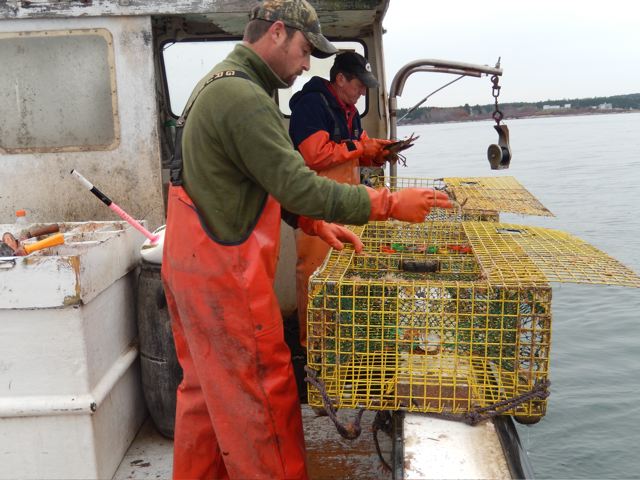
Dorie Klissas
For Immediate Release | Contact: [email protected] | 917-287-5643
New England Lobster Fishers Sound the Alarm on Ocean Change
Manomet Conservation Sciences Tap Fishers’ Insights to Uncover How Warming Waters Disrupt Marine Food Webs
Plymouth, Massachusetts, October 16, 2025: Manomet Conservation Sciences plays a critical role in strengthening coastal resilience. With rapid climate change threatening coastal ecosystems, scientists are turning to local fishers for critical insights. In a September 2025 study in Fish and Fisheries, scientists conducted interviews with lobster fishers, finding that their knowledge can be invaluable in enhancing our understanding of the diverse impacts of warming waters on coastal ecosystems.
“As a result of warming waters, species are moving poleward and have the ability to disrupt food webs, increasing predation on or competition with local species,” says Marissa McMahan, PhD, Director of Fisheries at Manomet Conservation Sciences. “This is happening against a backdrop of other changes, including invasive species, pollution, overfishing, and coastal habitat loss. These shifts have exceeded the ability of management efforts to keep pace, resulting in challenges for fisheries as they try to adapt to changing ecosystems.”
As described in the paper, “Fishers’ Local Ecological Knowledge Reveals Complex Food Web Dynamics with Rapidly Warming Waters,” local ecological knowledge (LEK) can provide critical information, especially as rapidly changing conditions impact fisheries. For example, Indigenous knowledge has provided insight into the Pacific cod industry, helping document population levels after a recent marine heatwave.
For this study, scientists focused on the New England lobster fishery. The Gulf of Maine is warming faster than 99% of the global ocean, and several new species have arrived, including black sea bass and blue crab. These range-expanding species are potential food web disruptors because they prey on and compete with lobsters and other local species.
“The small-boat nature of lobster fishing, with many individuals working over a vast coastline, contributes to well-developed knowledge,” McMahan explained. “Coastal communities in the region are highly dependent on fisheries, and disruptions can have large cultural and economic impacts.”
Between July 2023 and March 2024, scientists conducted surveys and in-depth interviews with 45 lobster fishers from Maine and Northern Massachusetts. They documented what fishers are observing about warming waters and the species interactions affecting lobster populations.
Key Findings from Fishers’ Knowledge:
Predation pressure: Fishers identified seven key lobster predators—including striped bass, Atlantic cod, black sea bass, seals, blue crabs, and green crabs. Striped bass were considered the most significant predator.
Life-stage vulnerability: Lobsters are preyed on at every stage—larval, juvenile, and adult—by multiple species, including seals and crabs.
Food web complexity: Fishers described dynamic interactions, such as seals shifting to lobster after feeding on alewives, or squid indirectly benefitting lobsters by preying on fish that would otherwise eat them.
Regional differences: Striped bass were seen as the top predator in Maine, while seals were more significant in Massachusetts. Crabs were perceived as more impactful in Maine.
Warming waters as a driver: Warmer waters were linked to increases in species like striped bass, green crabs, blue crabs, and seals, while cod and native crabs were thought to be declining. Some fishers noted that inshore lobster populations are more stressed by warming than offshore populations.
Why This Matters for the Future
The study shows that fishers’ detailed ecological observations can help fill gaps in scientific monitoring, which often lags behind the speed of environmental change. Incorporating LEK into management frameworks could provide faster, more flexible responses to climate impacts.
For example, Manomet has already developed a reporting tool for blue crab sightings and is working on a similar dashboard for lobster fishers to track black sea bass encounters. Both state and federal fisheries managers have expressed interest in integrating these real-time observations into decision-making processes, such as NOAA’s State of the Ecosystem reports.
As the Northwest Atlantic rapidly warms, fishers’ insights offer a frontline perspective on how ecosystems are shifting. Their knowledge can be paired with traditional science to inform adaptive management strategies that support both ecological resilience and the cultural and economic sustainability of coastal communities.
This research was funded by the National Oceanic and Atmospheric Administration’s Sea Grant Program, the American Lobster Initiative, and the Canada Research Chairs Program.
About Manomet Conservation Sciences
Manomet is a science-driven conservation organization with deep roots in bird conservation. Teams across the Western Hemisphere are focusing on improving the health of flyways and ecosystems that are being challenged by climate change and human activities. The goal is to reverse the decline of shorebirds, promote coastal resilience, and educate and empower the next generation of conservationists. To learn more, go to: https://www.manomet.org/





 Back to all
Back to all